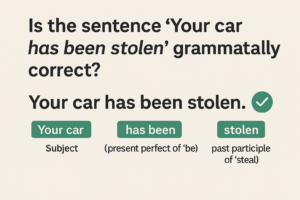English learners often ask, “Is the sentence ‘Your car has been stolen’ grammatically correct?” The answer is yes. This sentence is a proper and commonly used example of the present perfect passive tense in English. Understanding how and when to use this structure can make your English more fluent and accurate.
The sentence “Your car has been stolen” is grammatically correct because it follows the standard form of the present perfect passive:
Subject + has/have been + past participle.
-
Your car (subject)
-
has been (present perfect of “be”)
-
stolen (past participle of “steal”)
This structure tells us that the action (theft) happened at an unspecified time in the past but has a present effect. In this case, the effect is clear: the car is missing now.
Compare it with the active voice:
-
“Someone has stolen your car.”
This is also correct, but it focuses on the person who did the action. The passive version, “Your car has been stolen,” emphasizes the object (the car) and is more suitable when the doer is unknown or unimportant.
Using the present perfect passive is helpful when reporting crimes, accidents, or news. Other examples include:
-
“My phone has been lost.”
-
“Her bike has been damaged.”
-
“The documents have been submitted.”
Many learners struggle with this structure because their native languages don’t use the passive voice in the same way. But using it correctly makes your English sound more natural, especially in formal or serious contexts.
So, is the sentence “Your car has been stolen” grammatically correct? Absolutely. It’s not only correct but also practical, especially in real-life situations where the focus is on what happened rather than who did it. I am sure you have understood this rule. Keep visiting my site to enhance your knowledge of English grammar.

She has been OR She was:
The Knight in The General Prologue:
https://englishlitnotes.com/2025/05/23/the-knight-in-general-prologue/
Sir Alexander Fleming by Patrick Pringle:
https://englishwithnaeemullahbutt.com/2025/06/02/alexander-fleming/
Edgar Allan Poe: https://americanlit.englishlitnotes.com/life-and-legacy-of-edgar-allan-poe/